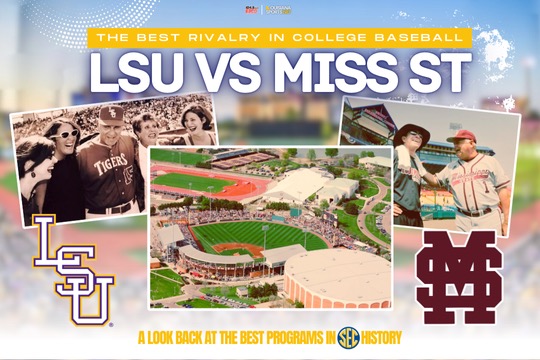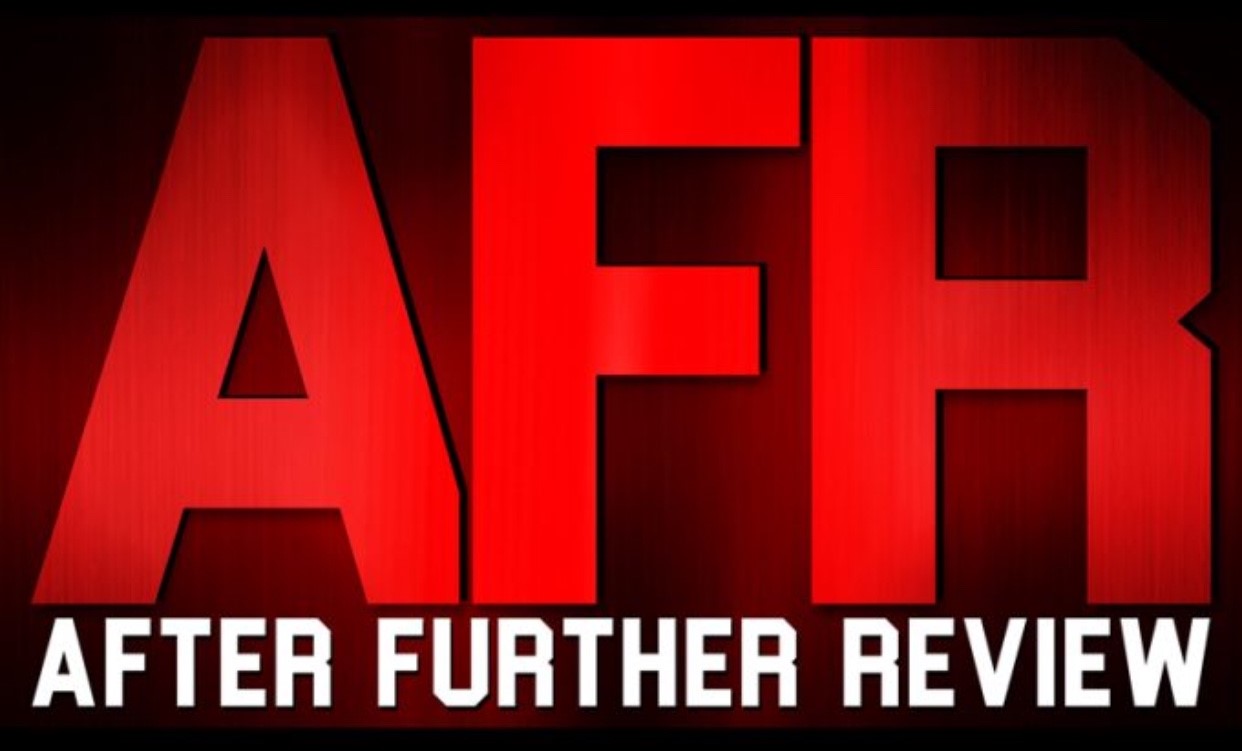The Rivalry That Built the SEC: LSU vs Mississippi State Baseball

By Rivers Hughey
Some rivalries are born from geography. Others, from tradition. LSU vs. Mississippi State baseball? It’s a little bit of both—wrapped in decades of history, iconic players and the relentless pursuit of championships.
With 219 wins, 194 losses and one tie, Mississippi State leads the all-time series. But numbers don’t tell the whole story. This is a rivalry that shaped the sport itself, one that Skip Bertman and Ron Polk helped mold into something bigger than just a game.
“The LSU-Mississippi State baseball series has so much history behind it. It’s a great series,” said Jake Mangum, Mississippi State great and the SEC’s all-time hits leader. “When I was at Mississippi State, we were really close with the LSU baseball team. We were friends with them, but we competed against each other. It was a really cool dynamic.”
Mangum’s admiration for the rivalry starts with the fans.
“The fans are what make the culture what it is. Both fan bases care so much about this rivalry. The bragging rights, the trash talk, the hospitality—it’s all there. It just gets settled in a three-game series.”
This isn’t just another series on the schedule—it defines a matchup that helped shape the SEC into a baseball powerhouse.
A Rivalry That Changed the SEC
Paul Mainieri reflected on how the conference evolved over time with LSU and Mississippi State leading the charge.
“I came to LSU in 2007, and even back then, it was already the dominant baseball conference in the country. Every Friday night, you were facing a future first-round draft pick, and every team had multiple guys who would go on to play in the majors.”
Even with that foundation, SEC baseball has only grown stronger.
“Every school has invested in its program—beautiful facilities, top-tier coaches, full financial support, said Mainieri. “Add in the transfer portal, NIL and advancements in things like strength training and nutrition, and it’s become an animal of its own.”
It wasn’t always this way, though. The SEC wasn’t always synonymous with baseball dominance.
“When I played at LSU in 1976, nobody really cared about baseball in the SEC—it was a football conference,” Mainieri recalled. “Our baseball coach, Jimmy Smith, was actually the equipment manager for the football team. That tells you everything you need to know.”
Everything changed when Ron Polk arrived at Mississippi State.
Ron Polk is a legend 🤣 pic.twitter.com/C20aAZuYsM
— SEC Network (@SECNetwork) April 14, 2020
“Ron Polk kind of force-fed the people of Mississippi that college baseball should matter. Then Skip Bertman came to LSU, and before you knew it, we had this great rivalry. Every time they played, the crowds grew, and both teams were going to the College World Series. Other schools saw what was happening and decided to invest in their programs.”
And their recruiting battles were just as intense as their games.
According to Skip Bertman, he recruited Rafael Palmeiro when he was in Miami, and he believed that if he had arrived at LSU one year earlier, he would have recruited Will Clark, as well.
Years later, Bertman and Polk found themselves in a battle over Doug Thompson who would help lead LSU to the 1997 national championship.
Polk called Thompson late in the process and told him, “you’re the missing piece we need to make it to the national championship.”
Shortly after, Thompson came home to a message on his answering machine from Bertman.
“I heard Ron Polk told you you’re the missing piece they need to make it to Omaha. Well, we’re going with or without you.”
Thompson chose LSU. The Tigers won the title. And the rivalry kept growing.
The Legends and the Lore
The stories of this rivalry are endless.
Like the lore that there was a game against the two in the 1980s when demand for tickets at Alex Box Stadium was so high that fans were lined up on the field of play to watch. Someone from LSU had to fight off the fire marshal just so the game could be played.
Or the time Mississippi State fans essentially smoked out former Tiger Mikie Mahtook during a game in Starkville.
“The fans in the outfield were drinking and grilling like they normally do,” Mahtook recalled. “Then they got the great idea that every time a fly ball was hit toward me, they would open their grills at the same time and try to smoke me out. The smoke would linger and act like this huge cloud—a cloud that smelled great—and try to blur my vision on fly balls. It made seeing the ball extremely hard.”
Thompson still remembers the chaos of playing in Starkville.
“Mississippi State always got the best of me personally…Looks like I had three starts against them over my two years. But, in the second game of the ‘98 World Series, I pitched the final 3.1 innings in an intense game that ended 10-8 to pick up a save—so I guess I finally redeemed myself!”
Mississippi State fans take pride in their atmosphere. Long-time Mississippi State media member Brian Hadad has seen the rivalry from every angle.
“These are without question the most die-hard devoted fanbases in college baseball. Omaha salivates at the idea of a State-LSU final series—it would set records.”
2017: The End of an Era
The 2017 series in Starkville wasn’t just another matchup between LSU and Mississippi State—it was the final series ever played at the original Dudy Noble Field.
Mississippi State slugger Brent Rooker understood the significance.
“I knew it was the last series at the old Dudy Noble, so we obviously wanted to leave the fans with a lasting positive impression,” Rooker said. “We wanted to send the stadium out with the type of series it deserved. But I also knew that LSU was much better than us, so my hope was kind of met with skepticism. I wanted to win the series, but I also knew we needed to play really, really well to make it happen.”
LSU outfielder Greg Deichmann recalled how important the series was for LSU, as well.
“We knew we were already making the postseason, but we wanted to have some momentum going into it, as well as securing a national seed to host a regional. So, we were aware that the series carried a lot of weight.”
LSU shortstop Kramer Robertson knew that containing Brent Rooker was a crucial piece.
“I definitely remember holding my breath every time Rooker was up to bat.”
Deichmann was right there with him, having spent the whole season competing with Rooker for offensive accolades.
“They had the best hitter in the nation that year in Brent Rooker who I was chasing all year in every offensive category. And he ultimately ended up winning the Triple Crown.”
Mississippi State head coach Andy Cannizaro—who had previously been LSU’s hitting coach—had a strategy to neutralize Deichmann.
“I remember speaking to him before the series, and he told me that I wouldn’t get to hit that weekend,” Deichmann said. “At first, I thought it was a joke, but if you go back and look, I had four walks Thursday night, three Friday night, and three Saturday.”
Deichmann appreciated the challenge.
“For me, getting the ‘Barry Bonds’ treatment makes you feel pretty good as a hitter.”
Rooker had his own memorable hitting moment.
“I remember that double I hit on Saturday because it broke the single-season record for most doubles in a season at Mississippi State,” Rooker said. “That was exciting. It was a big hit in the game, too. We were still close enough to have a chance to win.”
Despite the momentum, LSU swept the series—the first time in program history the Tigers had done so in Starkville.
“That sweep in 2017 was historic—it was the first time LSU had ever swept Mississippi State in Starkville,” Mainieri said. “And then, of course, we had to beat them again in the Super Regional in Baton Rouge just to get to Omaha.”
TIGERS WIN!! #LSU claims the program’s 1️⃣7️⃣th @SEC Championship with an 11-7 win over Mississippi State. pic.twitter.com/Ubdf5YgEPC
— LSU Baseball (@LSUbaseball) May 21, 2017
The Last Weekend at the Old Dudy Noble
For as long as I can remember, Dudy Noble Field has felt like home. Growing up, I spent more time running through the outfield than I did sitting in the stands. My parents would set me loose the moment we arrived, knowing I’d be occupied for hours—climbing on old structures I miraculously never fell off of, rolling down the grassy hill in left field, checking back in for a hot dog before sprinting off to the trees behind right.
As I got older, the traditions evolved, but the memories remain just as vivid. I got broken up with for the first time in left field. I sat in my college boyfriend’s fraternity-built lounge structure—one that should have never been approved yet somehow was. I watched walk-offs and blowouts, ate some of the best food of my life and felt the unique magic that only Dudy Noble could create. Now, I get to watch my own kids run barefoot through the outfield—thankfully in a much safer environment than the one I grew up in.
When the 2017 season rolled around, I knew there was no way I could miss the final weekend in the old Dudy Noble before the renovations changed it forever. The fact that the series was against LSU only made it more fitting. For the players, the focus was on winning the SEC West. For me, it was about holding onto a piece of this place before it changed forever.
The baseball itself? I won’t lie—it wasn’t the highlight for us in the outfield. LSU was dominant, and we knew by Saturday night that the series was lost. But thanks to a long rain delay, our party stretched into the night. My friends decided to throw their own version of the “Catalina Wine Mixer,” complete with themed outfits and (allegedly) a Fireball shot ice luge. We ate, we drank, we drowned our sorrows in laughter and nostalgia.
But the moment that has stayed with me the most wasn’t about baseball at all.
With the game out of reach and our focus long since shifted, someone near us raised a speaker over their head, and suddenly, Four Non Blondes’ “What’s Up” was blaring across right field. A few of us started singing. Then more. Soon, it wasn’t just our group—it was everyone around us. And then I realized something even better. Just beyond the right field, in the bleachers filled with LSU fans, they had joined in too.
We may have left the weekend on different sides of the scoreboard, but for that one moment, we were all just standing together, beers in hand, screaming:
“And so I wake in the morning and I step outside
And I take a deep breath and I get real high
And I scream from the top of my lungs
‘What’s going on?'”
For one night, we all did it together—as part of a rivalry that shaped SEC baseball and will continue to do so for generations to come.
A Legacy That Lasts Forever
Even as stadiums are rebuilt and new players emerge, the rivalry remains as fierce as ever.
“It’s rare that a rivalry is as heated and passionate as this one while also featuring the two programs that set the standard for the entire sport,” Rooker said.
And as the rivalry continues, some things remain the same.
Bertman and Polk, two men who shaped SEC baseball, will still find time this week to sit down for lunch, reminiscing about the rivalry they built and the sport they helped define.










